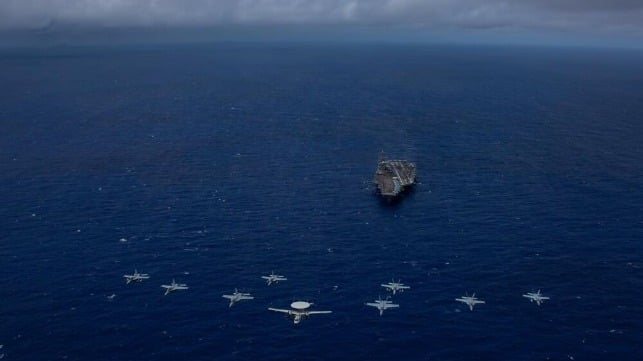Pentagon: No U.S. Navy Carrier in Mideast After USS Abraham Lincoln Leaves

The carrier USS Abraham Lincoln will be leaving the Middle East within a few months and will not be replaced with another carrier strike group, the Pentagon confirmed Friday. A persistent carrier presence has been a key part of the U.S. strategy to deter Iran from attacking Israel; instead, the Defense Department will dispatch a squadron of B-52 bombers and a task force of Navy destroyers to substitute for the powerful airstrike capability of a supercarrier.
"These forces will begin to arrive in coming months as the USS Abraham Lincoln Carrier Strike Group prepares to depart," Pentagon press secretary Maj. Gen. Pat Ryder.
USS Abraham Lincoln departed San Diego on July 11 and was diverted to the Mideast in August. The typical deployment length for a U.S. Navy carrier is about seven months, but this timeline is often extended if a carrier strike group is needed for national security purposes. Lincoln will reach the seven-month mark in February.
On Saturday, hours after Ryder's announcement that Lincoln would be replaced by other assets, Iranian supreme leader Ayatollah Ali Khamenei pledged that "the enemies, whether the Zionist regime or the United States of America, will definitely receive a crushing response." He referred to the Israeli airstrike on Iranian military sites on October 26, which was intended to punish Iran for a ballistic missile strike on October 1, which Tehran carried out to punish Israel for a campaign of assassinations.
Just weeks ago, Khamenei appeared to soft-pedal the effects of the Israeli strike. Rather than calling for retribution, he said that the impact of the Israeli attack "should not be exaggerated." However, last week his subordinates began to issue statements with more threatening language, promising a "fierce and tooth-breaking" counterattack on Israel.

that matters most
Get the latest maritime news delivered to your inbox daily.
According to the Wall Street Journal, Iranian sources have been willing to talk about the details of their plans. This time, Tehran is contemplating a larger and more complex ballistic missile strike on Israeli territory, timed to fall between the end of the U.S. election on November 5 and the inauguration of the next U.S. president in mid-January - the twilight days of the Biden administration.
The previous round of Israeli retaliatory airstrikes on October 26 inflicted considerable damage on Iran's air defenses, and Israeli sources have promised a swift and thorough repeat of that campaign if Iran launches ballistic missiles again. The deployment of U.S. Air Force B-52 bombers - a 250-ton aircraft with a massive radar signature - could reflect an expectation of degraded Iranian air defenses.
